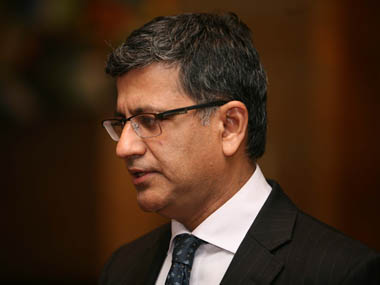Munesh Khanna is a familiar face in the world of mergers and acquisitions (M&A). Having had stints at DSP Merrill Lynch, NM Rothschilds, Enam and Centrum, among others, Khanna has just joined Grant Thornton to head its M&A and Private Equity practice as senior partner.
In an exclusive interview with Firstpost, he speaks about the prospects for M&A and private equity in India in these challenging times, and remains bullish that acquisitions will continue despite the uncertain economic conditions.
Excerpts from the interview:
FP: You say in the present uncertain scenario, cash is king for corporates. So do you think companies will keep the cash to see the downturn through, or also use them for acquisitions for growth?
[caption id=“attachment_186064” align=“alignleft” width=“380” caption=“Munesh Khanna.”]  [/caption]
MK: I think M&As will happen, consolidation will happen and there’ll be a significant amount of both. The view is that the eurozone is in crisis and banks have interlent to each other. So there’ll be a lot less credit coming into the system. Therefore, I don’t think there’s a debt bubble but there’ll be a lot of refinancing which will be needed in the emerging economies.
Companies may be financially sound but they will find it difficult to get refinancing at an acceptable cost. Therefore, my view is that ‘cash is king’. Those who have got cash will be able to get refinance easier. They will then be in a much better position to expand their businesses, undertake M&A and consolidation activities.
FP: What about private equity? There’s so much talk about PE being in a shambles, exit opportunities drying up and valuations going haywire…
MK: PE will also drive M&A because public market exits (sale of shares through market offers) will become more difficult. Public markets will also want more critical mass. So if you’re less than a Rs 1,000 crore market cap company, there’s no point in going to the market. The PEs will, therefore, drive M&A much more.
Also, a lot of PE money in the past has gone to technocrats, first-time entrepreneurs, etc, who are not as averse to selling their businesses as the older generation was. Psychologically, many in the older generation got into businesses simply because they got a licence and then held on to them because they got too attached to them. I think the newer entrepreneurs , professional ones and technocrats who turned entrepreneurs, feel they can sell off businesses after they have started it and scaled it up.
FP: Do you see a generation of serial entrepreneurs coming up as a result of such activity?
MK: There are some very successful serial entrepreneurs and we will now see many more of them, because people are now of the view that they’ve created something and can move on to something else.
FP: Do you think there are stories in Middle India where M&A and PE activity will flourish? Or is PE still guided by valuations alone?
MK: Lessons have been learnt, decisions are more rational and diligence is much more intense. And so, yes, more and more business models are being tested.
FP: Do you see any particular sectors being more prone to M&A in the coming days?
MK: I think there are two themes . One is generally across businesses, manufacturing and services, the theme of consolidation. Three hospitals or hotels coming together, consolidating, using one brand, economies of scale. Manufacturing facilities being consolidated, etc. The other is regulation-led consolidation, like in pharma.
Sooner or later, we will also see such regulation-led consolidation in telecom as well. So there will be these two themes. M&As is on the rise. The third theme will be cross-border mergers.
FP: You believe the US and Japan will again lead in in-bound M&As as cash conservation happens. Do you think that is realistic?
MK: Yes, in-bound M&As will rise again. If I am a US company, whatever multiple I am trading at, I can buy an Indian business at 25 percent higher multiple and still be earnings-accretive. There’s no evil empire in the world other than the US, and they’re bloody good at it!


)
)
)
)
)
)
)
)
)



